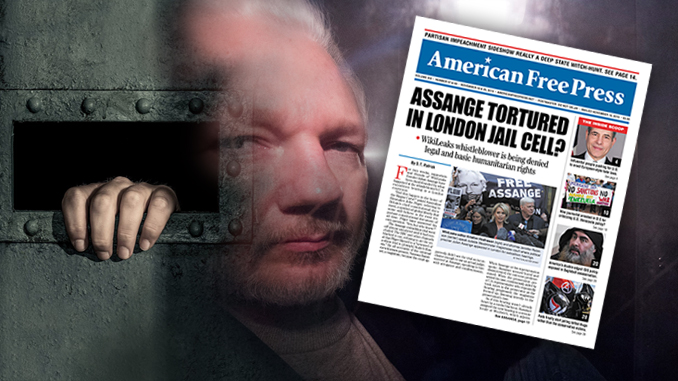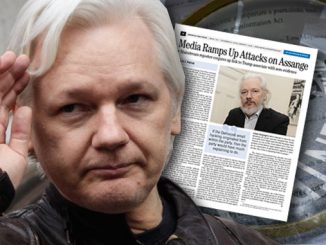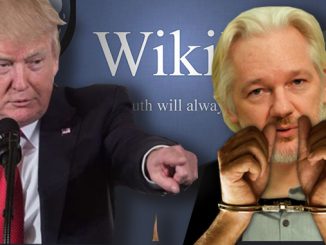
The WikiLeaks founder and whistleblower is being denied legal and basic humanitarian rights.
By S.T. Patrick
For two weeks, supporters and friends of WikiLeaks founder Julian Assange have been dumbfounded by what happened at the whistleblower’s U.S. extradition hearing in a London courtroom.
“Did this happen in the home of the Magna Carta?” asked Australian filmmaker John Pilger, referring to Britain’s chief constitutional document, a symbol of global liberty that some still believe is the most important constitutional document of all time. Pilger later answered his own question. “Yes, but who knew?”
The Assange extradition trial went off almost unnoticed until it had concluded. The BBC and other channels blacked it out, refusing to air the trial that Pilger likened to a “newsreel of a show trial in [Joseph] Stalin’s Russia.” By all accounts of the minimal eyewitnesses present, Vanessa Baraitser, a magistrate, because the court apparently didn’t see the trial as inconclusive enough to use an actual judge, sneered at Assange, speaking to him with arrogance and condescension. When Assange or his representation spoke, Baraitser seemed bored and disinterested, the outcome predetermined. When the prosecution presented its case, continuously aided by a U.S. representative who repeatedly took notes to the prosecutor as the hearing progressed, the magistrate livened up, listening intently to the prosecution’s case.
As if this hearing wasn’t already beset by a media blackout, Baraitser assigned the next hearing to a remote locale at Woolwich, which adjoins Belmarsh prison. With even fewer seats made available to the public, most commentators defending Assange and the state of global journalism will not be allowed inside. After rejecting the Assange team’s request for additional preparation time—Assange has been denied access to legal documents and research, by which he could defend himself—ensuring that the next hearing will be as secret as can be while still being officially public was yet another dagger into the state of free speech and the free press in court.
News-gathering organization Reuters described Assange, 48, as “confused,” struggling to answer questions about his name and age. He has spent seven years barricaded inside Ecuador’s British embassy and, since April, has been in a permanent state of solitary confinement where sensory depravation and a lack of access to humanity are his new normal. The inhumane imprisonment is designed to break him before he is ultimately sent to the United States to answer for 18 counts, including hacking government computers and violating parts of the Espionage Act. A vital, motivated, lively Assange is a heavyweight contender who has built a career on courage, exposing the worst misdeeds of the most powerful governments, financial powerbrokers, and militaries in the world. When he appears before a judge in the U.S., he will stand as a shell of that Assange.
When Baraitser asked him if he understood what was happening, Assange replied, “Not really,” before attempting to expose the conditions in which he has been forced to live. Stating that he was unable to “think properly,” Assange said, “I don’t understand how this is equitable. I can’t research anything. I can’t access any of my writing. It’s very difficult where I am.”
WikiLeaks editor Kristinn Hrafnsson argued on social media that the case should have been thrown out. “Not only is it illegal on the face of the treaty, the U.S. has conducted illegal operations against Assange and his lawyers which are the subject of a major investigation in Spain.” Hrafnsson is referring to a charge that the CIA used the Spanish security company Undercover Global S.L., hired to protect the embassy during Assange’s time there, to spy on Assange and his attorneys during the stay in the Ecuadorian embassy in London. Spain’s highest court, the Audiencia Nacional, is investigating undercover Global S.L. and its owner, David Morales.
In the words of Pilger: “No one doubts—not his enemies at The New York Times, not the Murdoch press in Australia—that if he is extradited to the United States and the inevitable supermax, journalism will be incarcerated, too. Once there were spaces, gaps, bolt holes in mainstream journalism in which mavericks, who are the best journalists, could work. These are long closed now. The hope is the samizdat on the internet, where fine disobedient journalism is still practiced.”
Rather than reporting on the farce of a hearing that occurred in London, the American mass media focused instead on Assange’s confused answers and his denial of extension. The undertone is one of punishment: Had he only played ball with the U.S. government and the world’s most powerful financiers, had he only attended a proper journalism school, had he only gumshoed it at an established newspaper in a metro area for decades first, he would be worth defending. Instead, he formed his own journalistic organization and dedicated himself to exposing the darkest areas of geopolitical maneuvers, doing what the mainstream media throughout the world refuses to do. He is everything they are not, and the alternative media should unite in hope that he is everything we are.
S.T. Patrick is a freelance journalist based in the Midwest.






